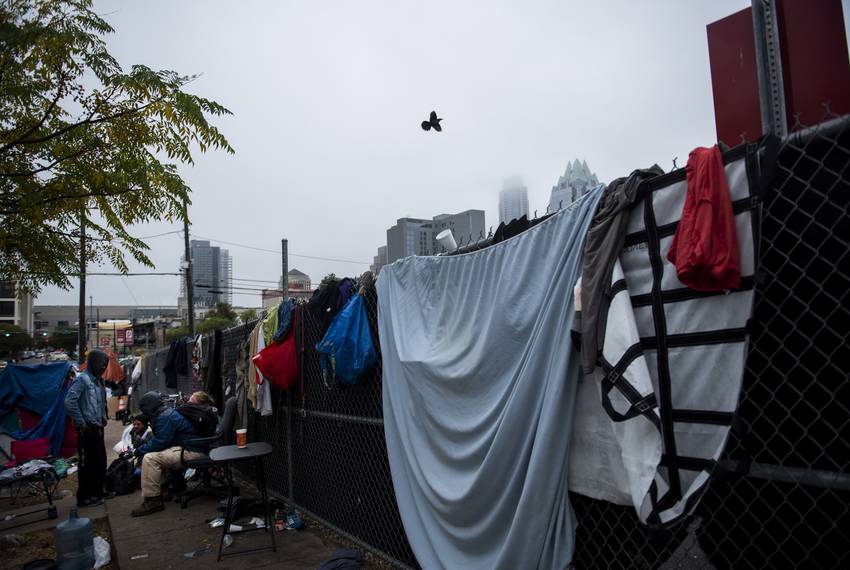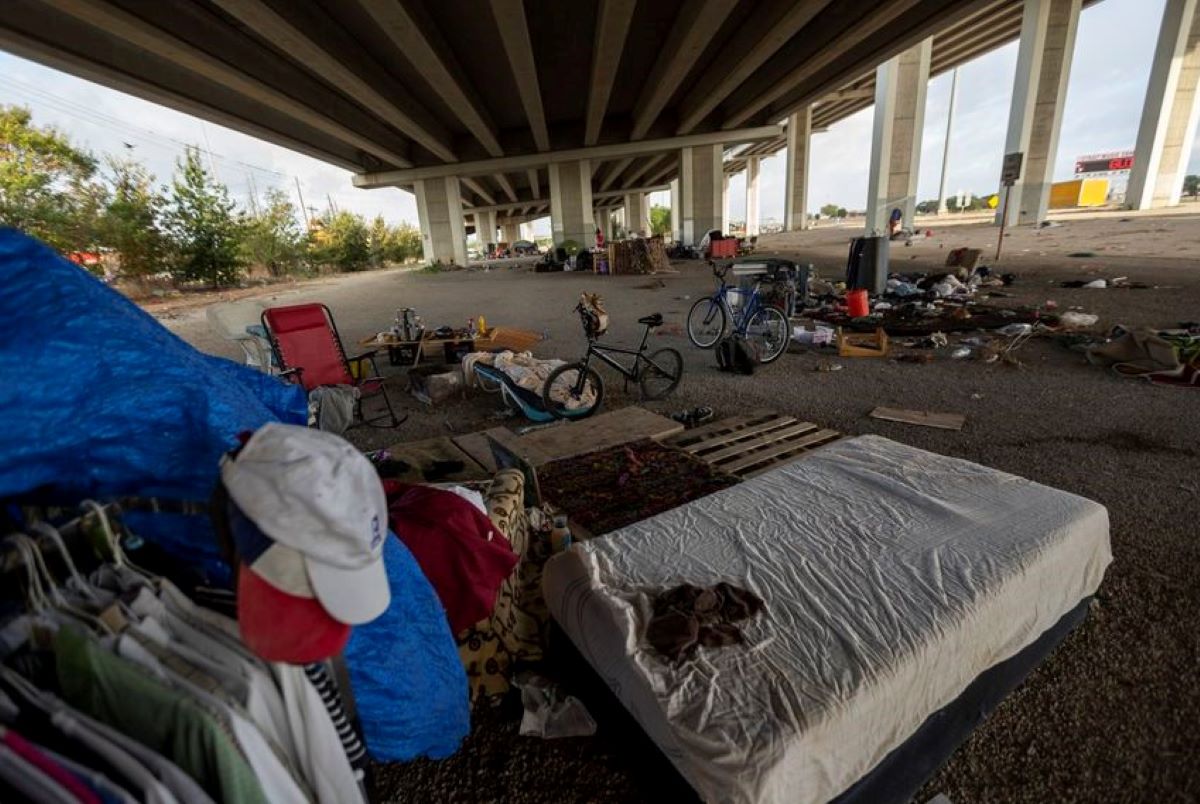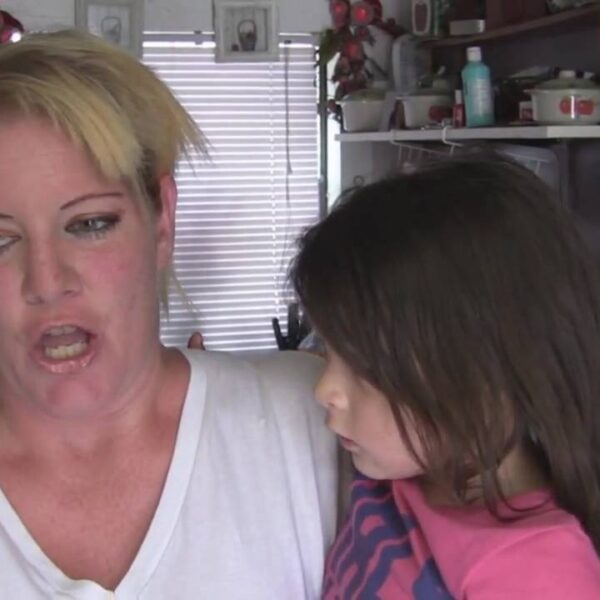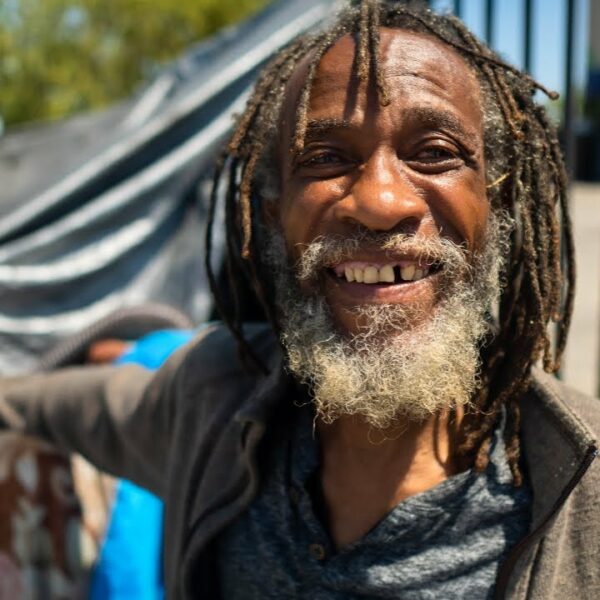The governor’s decision to force homeless people from under state overpasses drew the ire of city leaders and homelessness experts, who criticized Abbott’s “fear-based approach.”
The deadline is near.
At Gov. Greg Abbott‘s direction, the Texas Department of Transportation will begin forcing people experiencing homelessness from encampments under state overpasses in Austin and removing any personal property that is left behind.
Abbott’s announcement of the pending move came after he gave Austin officials a deadline to show “consequential improvement” in dealing with homeless people camping in or near highly visible public places or risk state intervention. An Abbott spokesman said the governor’s office wanted to see less feces and fewer needles in the city. But Abbott’s office never publicly specified a threshold or process for measuring incidents of human waste or needles before ordering the state to step in.
The governor’s decision swiftly prompted strong criticism from city leaders and homelessness experts. Austin City Council member Greg Casar called Abbott’s move a “political stunt” and Eric Samuels, the president and CEO of the nonprofit Texas Homeless Network, said it was “counterproductive ” in the short term.
The pushback wasn’t new.
Ever since the Austin City Council relaxed some ordinances regulating the public spaces in which people can camp, the governor has criticized local officials and pointed to “reports of violence, used needles and feces,” mentioning potential public health risks associated with people experiencing homelessness. But Austin officials say crime and health data disprove Abbott’s narrative.
“We’re focused on housing, not hiding,” Austin Mayor Steve Adler wrote in a tweet, adding that the city has moved 400 people off the streets and into housing over the last 60 days.
Abbott and Adler have swapped public jabs for months — and throughout the weekend — about the city’s response to its homeless residents.
The mayor has criticized Abbott for spreading misinformation through Twitter, while experts say the governor is taking a “fear-based approach” instead of working with Austin leaders to help residents who don’t have homes.
“If we get people upset enough about it and angry and scared enough, then there’s some political gain in it for people,” said Matthew Mollica, executive director of Austin’s Ending Community Homelessness Coalition. “And that’s just really unfortunate.”
As those political fights have played out, homeless Texans have been caught in the crossfire, often receiving information about their fates after leaders already made key decisions.
Harvest, a homeless woman in South Austin, said she lives under an overpass to protect herself from the elements — not so she can “be an eyesore” to the scores of Austin residents who drive by every day. She asked that her full name not be used because she fears being targeted by other homeless people.
Harvest said she wishes officials would consider the toll it takes when government leaders repeatedly change where people experiencing homelessness can and cannot stay.
“Every time they come through here, they disrupt our whole home. We lose things. And, I lost one of my favorite shoes last time, like not a big deal to you, but I can’t go out and buy a new pair.” ~Harvest, a homeless Austin resident
Ordinance Back-and-Forth
Following heated debate in June, the Austin City Council rolled back ordinances prohibiting camping, sitting and lying in public spaces that many said criminalized homelessness.
Backlash ensued. Abbott threatened to override the change, and later shared a tweet that wrongly linked a car accident to people experiencing homelessness running through traffic.
Public debate raged as Adler admitted homelessness became more visible in Austin but defended the city’s policy.
“We haven’t created any more people experiencing homelessness over the last month. Now they are more visible,” Adler said in August, “but it is still the same person that needs a place to stay.”
Dozens of residents — including some with “Recall Mayor Adler” stickers — weighed in during an hours-long Oct. 17 council meeting. Some argued for a reinstatement of the pre-July camping ban, while others argued against any new restrictions on camping and urged the council to focus on finding housing for unsheltered residents.
The council voted 7-4 in favor of an ordinance which bans camping on city sidewalks, near homeless shelters and in high wildfire risk areas. The changes went into effect on Monday.
Reality Check
On several occasions, Abbott has tweeted out reports of alleged crimes committed by homeless people in Austin, while asking residents to post “public safety threats and pictures showing unsafe conditions” to Twitter and tag Adler. Most recently, Abbott highlighted a video that shows a man damaging a car with metal poles in downtown Austin. The video was originally posted 17 months before Austin officials initially rolled back city ordinances. And the man’s family asked the governor to delete the tweet because he wasn’t homeless, according to CBS Austin.
An Abbott spokesman said the governor did not reference homelessness in the tweet.
“He pointed out what the video shows and what everyone knows, lawlessness has increased on downtown streets in Austin,” John Wittman said in a statement. “The Governor will always call out lawless behavior and will take action to keep Texans safe.”
Earlier this month, Abbott sent Adler two letters about homelessness — the first setting a Friday deadline for Austin to “demonstrate consequential improvement” or risk state intervention and the second calling on the city to reinstate its camping ban and highlighting reports of unsanitary conditions on Austin’s streets.
But Adler and Austin city staff have rebuffed the notion that the city’s homelessness crisis is a threat to public health or safety.
The mayor pointed to crime data indicating a 6% increase in violent crime and a 5% increase in property crime when comparing summer 2019 — after the camping ban was relaxed — with summer 2018. Those figures include all crimes in the city, not just those involving homeless residents.
“Those are all small numbers relative to what you would get a feel for if you’re only watching social media in the city,” Adler said.
Austin Police Chief Brian Manley this month told city officials that from summer 2018 to summer 2019 there was a 15% increase in violent crime and a 20% increase in property crime where the suspect and victim were both homeless. In cases with a homeless suspect and a non-homeless victim, violent crime increased by 11% and property crime by 2%. And in cases with a homeless victim and a non-homeless suspect, violent crime increased 19% and property crime increased 42%.
Stephanie Hayden, director of Austin Public Health, said in a council work session Oct. 15 that the city is not in the midst of a public health crisis, adding that she is not aware of any spread of communicable disease from the homeless population to the non-homeless population since June. The Austin Parks and Recreation Department also reported that it has not seen “a measurable increase” in feces, needles or garbage near encampments since June.
A Texas Tribune analysis of Austin municipal court data found a monthly average of 9.3 offenses related to human waste in the three months after the camping ban was relaxed, which is lower than the monthly average of 11.8 offenses in the four months before the change.

Communal clothes are hanged to dry on a fence across the Austin Resource Center for the Homeless this week. Eddie Gaspar/The Texas Tribune
Abbott’s Expansive Intervention Options
Texas statutes give the governor’s office broad authority to protect public health and safety. Abbott referenced several potential strategies in his Oct. 2 letter to Adler, including the Department of State Health Services’ ability to supervise areas of disease outbreaks and the Department of Public Safety’s authority to enforce criminal trespassing law.
In a statement provided to The Texas Tribune, DSHS said it is unaware of any disease outbreak in Austin but is continuing to monitor the situation. Saying that “there may be an increased health risk due to conditions surrounding homeless encampments” in the city, the department sent Austin a letter Wednesday asking for data on homeless encampments, infectious disease investigations and environmental or public health risks as a result of unsanitary conditions. The city has until Wednesday to respond.
DPS said in an email Thursday it would provide support as needed to TxDOT.
“Individuals who may be impacted by this measure are being provided with information and access to community resources to assist them,” the email said. “Officers will take law enforcement action as necessary and warranted by circumstances.”
On Oct. 18 — one day after the Austin City Council partially reinstated some camping, sitting and lying regulations — Abbott announced that TxDOT would “advance strategies” to force people experiencing homelessness out from under bridges and overpasses in Austin.
Then, one day after the reworked city ordinances went into effect, TxDOT began posting move-out notices under state overpasses.
Earlier this month, Abbott posted a video on Twitter from an event called Texas Picnic put on by Friends of the Governor’s Mansion where he met Lyric Wardlow, who was homeless as a child in Indiana.
“Determination led her out of homelessness & to a job,” Abbott wrote in the Tweet. “Now she’s dining at the Governor’s Mansion.”
Wardlow now works with Texas-based advocacy groups to tell her story and influence policies aimed at helping young people experiencing homelessness. Wardlow, invited to the event by a friend, said Abbott was impressed with her journey and asked to share it on social media.
Asked about a potential plan to remove camps under overpasses before Abbott’s formal announcement, she said the idea may be what Abbott sees as a way to “fix complaints that he’s hearing” from Austin residents. But she doesn’t think it is a viable solution.
“It’s still going to be the same amount of people sitting no matter what,” she said. “But I’m hoping that maybe creating a relationship with the governor, especially someone with lived experience, I can suggest different resources and different ways to make this whole thing a little bit easier for both sides.”
Spending Spat
Experts said Abbott is missing an opportunity to substantively address the issue and earn public support.
“He could use this to launch a governor’s challenge on ending veteran homelessness. That’s a very, very achievable goal,” said Samuels, the president and CEO of the Texas Homeless Network. “He could add on, let’s end homelessness for households with children. Also very achievable.”
Meanwhile, Abbott and Adler have also squabbled about public resources spent on homelessness. On Oct. 10, Abbott asserted that Austin is spending more than $20,000 for each person experiencing homelessness.
“Really, you’re killing me because we don’t have nowhere to go. I mean, it’s affecting me because what are we going to do? Where are we going to stay?” ~Gilbert Jones, a homeless Austin resident
The problem isn’t resources,” Abbott tweeted. “It’s prioritization. It’s inaction & word salad on an urgent public health & safety issue.”
Adler pushed back, saying the city’s $63 million in homelessness and related support services spending is spread across over 7,000 people annually.
About a quarter of Austin’s 2020 homelessness funding is a one-time allocation as the city maxes out its tax revenues before revenue caps passed by the Texas Legislature — and championed by Abbott — are enacted for the 2021 fiscal year.
Adler said the revenue caps will make it more challenging for Austin to address homelessness.
“I believe it is a failure of state leadership for there to be such a division between our state and its cities,” he said.
He also noted Austin receives fewer federal dollars than other Texas cities addressing their own homelessness problems, like Houston and Dallas.
A Department of Housing and Community Affairs spokeswoman said the state approved $15.2 million to address homelessness over the next biennium. The state allocated $662,843 to Austin for the 2020 fiscal year to provide shelter, services and case management to people experiencing homelessness or those at risk. The Legislature also allocated $25 million across the state to provide services from people experiencing homelessness and struggling with mental illness or substance abuse.
Addressing the Problem
Despite the public back-and-forth over the past month, Adler said he hasn’t been in contact with Abbott except to invite the governor and his staff to city staff meetings. An Abbott spokesman was checking to see whether anyone from the governor’s office has attended any meetings but did not get back to The Texas Tribune by late Wednesday.
The mayor referenced several ways in which the state could help, including providing more resources for substance abuse and mental health treatment, respite care, rental payment assistance programs and waste cleanup.
He said he hopes people, including state officials, can now move past fights over city ordinances since the city recently restricted the places homeless people can freely stay.
“I hope this community will now pivot to actually solving the challenge that we are facing,” Adler said. “And I think we can.”
Gilbert Jones — who lives under an overpass in South Austin with his pregnant wife — said he is trying to clean up trash nearby in hopes of changing lawmakers’ minds.
“Really, you’re killing me because we don’t have nowhere to go,” Jones said. “I mean, it’s affecting me because what are we going to do? Where are we going to stay?”
Jones said he doesn’t want to go to a shelter because men and women are separated, and the couple wouldn’t be able to “live as husband and wife.”
“I just pray that Abbott could really look into the heart of those who really want to do something with themselves,” Jones said.













